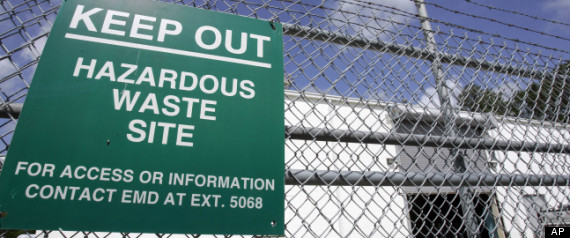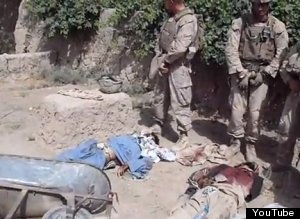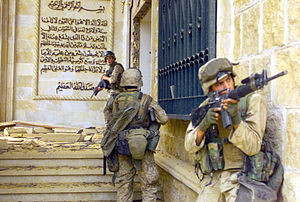 Government watchdogs are crying "bullshit" and calling the U.S. Navy a "bully" in response to a redacted federal report on the drinking water supply at the Marine Corps' Camp Lejeune, the site of an ongoing pollution scandal.
Government watchdogs are crying "bullshit" and calling the U.S. Navy a "bully" in response to a redacted federal report on the drinking water supply at the Marine Corps' Camp Lejeune, the site of an ongoing pollution scandal.
The report released on Friday is a prerequisite for studies to come out in the next couple of years exploring links between chemical exposures in the late-1950s to mid-1980s and what appears to be increased levels of cancer and other diseases among former Camp Lejeune residents. Watchdog groups say that redacting information pertinent to these studies could impede justice.
Camp Lejeune Water Contamination: Watchdog Groups Slam U.S. Navy Over New Report
Marine charged in deaths of 24 Iraqis in Haditha makes plea deal
 Prosecutors and defense attorneys in the court-martial of Staff Sgt. Frank Wuterich, accused in the killing of 24 unarmed Iraqis in 2005, announced an agreement Monday to settle the case.
Prosecutors and defense attorneys in the court-martial of Staff Sgt. Frank Wuterich, accused in the killing of 24 unarmed Iraqis in 2005, announced an agreement Monday to settle the case.
Wuterich will plead guilty to a single count of negligent dereliction of duty. Other charges were dropped. No announcement was made on what kind of discharge Wuterich would receive. The maximum sentence is three months in the brig. That decision will be made by the judge.
U.S. troops need better training on laws of war, experts say
 The court-martial of Marine Staff Sgt. Frank Wuterich at Camp Pendleton for his role in two dozen civilian deaths in the Iraqi village of Haditha has highlighted a legal peril for modern military personnel: determining who is the enemy.
The court-martial of Marine Staff Sgt. Frank Wuterich at Camp Pendleton for his role in two dozen civilian deaths in the Iraqi village of Haditha has highlighted a legal peril for modern military personnel: determining who is the enemy.
Troops these days fight in tense, foreign enclaves where terrorists wear no uniforms and take cover among women and children. They are on a mission to engage the enemy but are expected to hold their fire against civilians, a sacred tenet of international law.
Camp Lejeune Water Contamination Cover-Up Hinted In Navy Letter

The letter, signed by Maj. Gen. J.A. Kessler of the Marine Corps and dated Jan. 5, 2012, asks the Centers for Disease Control and Prevention's Agency for Toxic Substances & Disease Registry to withhold from a forthcoming report details about the whereabouts of water lines, wells, treatment plants and storage tanks on the North Carolina military base -- in the name of national security.
Marines probe video depicting urination on Taliban corpses
 The Marine Corps said Wednesday it is investigating a video depicting what appears to be four Marines urinating on the corpses of Taliban fighters. In a statement, the Marine Corps said it has not verified the origin or authenticity of the YouTube video. But it also said the actions portrayed are not consistent with Marine values.
The Marine Corps said Wednesday it is investigating a video depicting what appears to be four Marines urinating on the corpses of Taliban fighters. In a statement, the Marine Corps said it has not verified the origin or authenticity of the YouTube video. But it also said the actions portrayed are not consistent with Marine values.
If verified the video could create a strong backlash in the Muslim world and beyond for the disrespectful actions it portrays.
Navy SEAL accidentally shoots self in head
 The serviceman, who had been drinking with a woman at a bar before they returned to his residence, was showing her his 9 mm handgun when the accident occurred, SDPD Officer Frank Cali said.
The serviceman, who had been drinking with a woman at a bar before they returned to his residence, was showing her his 9 mm handgun when the accident occurred, SDPD Officer Frank Cali said.
The man offered to let his friend hold the weapon, which he mistakenly believed was unloaded, according to Cali. When she declined, he tried to demonstrate how safe it was by putting it to his head and pulling the trigger.
How Many U.S. Soldiers Were Wounded in Iraq? Guess Again
 Reports about the end of the war in Iraq routinely describe the toll on the U.S. military the way the Pentagon does: 4,487 dead, and 32,226 wounded.
Reports about the end of the war in Iraq routinely describe the toll on the U.S. military the way the Pentagon does: 4,487 dead, and 32,226 wounded.
The death count is accurate. But the wounded figure wildly understates the number of American servicemembers who have come back from Iraq less than whole.
More Articles...
Page 41 of 101

 Military Glance
Military Glance






























